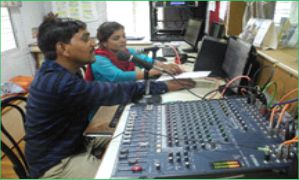|
Community Radio Enabling Rural Livelihoods Community radio is the easiest means of low-cost communication to remote communities and small groups. The radio reporters are people from the local villages and makes programmes on local issues affecting their communities.
Operating since October 2008, Development
Alternative Groupís Radio Bundelkhand (FM 90.4) has established its own
identity through its voice in 150 villages of three districts - Niwari,
Jhansi and Datia in Buldelkhand, a backward region of central India.
Radio Bundelkhand broadcasts programmes in the regional language Bundeli
on subjects ranging from agriculture, environment, water, education,
health, skill development, livelihood, child marriage, women
empowerment, Panchayati Raj, government schemes, preservation of
historical buildings and culture and Bundeli folk song Rural communities in drought prone Bundelkhand have been migrating for the last few decades to nearby towns and cities in search of work. Radio Bundelkhand has made a series of programmes addressing this issue of migration and rural livelihoods. Radio reporters first tried to get an in depth understand of the real issues affecting the community members. The villagers told the radio reporters that farming was adversely affected due to lack of water for irrigation. Men folk had to migrate to other places in search of jobs as there were no industries in the area where the people of the community could work. The rural women shared that they could not go out in search of work as they had to look after the farms, the home and the family so would like to have opportunities for self-employment where they could work from home to supplement the family income. In its livelihood programme series, Radio Bundelkhand started giving information of various livelihood related government departments and schemes such as Prime Minister Employment Generation Programme, Chief Minister Swarojgar Yojana, Chief Minister Young Entrepreneur etc. Information was also given on the radio regarding various schemes of the Agriculture and Horticulture Departments of the government. Many members of the community started contacting these departments after listening to these programmes on Radio Bundelkhand and avenues started opening up for them for self-employment, entrepreneurship etc. Case study of Jhalkari Bai Womenís Self-Help Group who established their own entrepreneurial venture after contacting Radio Bundelkhand This self-help group of women belonging to village Chandwani in district Niwari, were saving from 2011. One day, the leader of the group, Kamlesh Ahirwar heard the livelihood programme on Radio Bundelkhand and obtained information about various self-employment schemes of the government. The group liked the idea of making and selling incense sticks. In the next visit, the Jhalkari Bai womenís self-help group got their registration done in the Madhya Pradesh Khadi Gramodyog department and gave the necessary documents. Thereafter, this group was given training wherein the women learnt various aspects of incense sticks making. They also watched videos on YouTube. Every woman works on the machine for 2 hours a day and earns 3000 rupees per month. Kamlesh says that during the last 1 year, the group has earned about 30000 rupees per month. This income has helped them improve the standard of living of their families and helped the women in having a better say in family matters. ■
Chandra Prakash Niranjan
|
 s.
s.